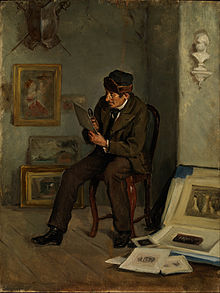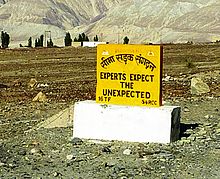Expert
person with broad and profound competence in a particular field
An expert is someone widely recognized as a reliable source of technique or skill whose faculty for judging or deciding rightly, justly, or wisely is accorded authority and status by peers or the public in a specific well-distinguished domain.



Quotes
edit- Quotes are arranged alphabetically by author
A - F
edit- In choosing people for specific jobs previous experience should not be a guide. I never put a man in the job which he thought he knew. Often the 'experts' make the worst possible Ministers in their own fields. In this country we prefer rule by amateurs.
- Clement Attlee, address to the Oxford University Law Society (14 June 1957), quoted in The Times (15 June 1957), p. 4
- An expert is a person who has found out by his own painful experience all the mistakes that one can make in a very narrow field.
- Attributed to Niels Bohr by Edward Teller; Cited in: Robert Coughlan. "Dr. Edward Teller's Magnificent Obsession," LIFE magazine (6 September 1954), p. 62
- In the media age, everybody was famous for 15 minutes. In the Wikipedia age, everybody can be an expert in five minutes. Special bonus: You can edit your own entry to make yourself seem even smarter.
- Stephen Colbert, "Be an Expert on Anything", Wired Magazine, 14:08 (14 August 2006)
- Experts bring light to dark places.
- The advice of a supervisor to a younger scribe (Eduba C), late third or early second millennium BCE.
G - L
edit- No lesson seems to be so deeply inculcated by the experience of life as that you should never trust experts. If you believe doctors, nothing is wholesome: if you believe the theologians, nothing is innocent: if you believe the soldiers, nothing is safe. They all require their strong wine diluted by a very large admixture of insipid common sense.
- Robert Gascoyne-Cecil Letter to Robert Bulwer-Lytton (15 June 1877)
- I think the people in this country have had enough of experts.
- Michael Gove, Interview with Faisal Islam on Sky News (3 June 2016)
- There appear to be no integrating forces, no unified meaning, no true inner understanding of phenomena in our experience of the world. Experts can explain anything in the objective world to us, yet we understand our own lives less and less. In short, we live in the postmodern world, where everything is possible and almost nothing is certain.
- Václav Havel, The Need for Transcendence in the Postmodern World, (1994)
- An expert is someone who knows some of the worst mistakes that can be made in his subject, and how to avoid them.
- Werner Heisenberg, Physics and Beyond : Encounters and Conversation (1971).
M - R
edit- We have not overthrown the divine right of kings to fall down before the divine right of experts.
- Harold MacMillan, Council of Europe Consultative Assembly, Strasbourg, 16 August 1950
- How much of a person's competence is based on knowing which actions not to take? We usually think of a person's abilities in positive terms... But one could take the opposite view that "An expert is someone who rarely slips up—because of knowing what not to do." However, this subject was rarely discussed in the twentieth-century—except, perhaps most notably, in Sigmund Freud's analysis.
- Marvin Minsky, The Emotion Machine (2006)
- If a man is trained, purely and simply, to be expert and contented in a particular task he will not innovate; Freud would have remained an anatomist, Marx a philosopher, Darwin a field-naturalist.
- John Passmore, The Perfectibility of Man, p. 282
S - Z
edit- The prevailing situation of criticism ... has given rise to a cult of professional expertise whose effect in general is pernicious. For the intellectual class, expertise has usually been a service rendered, and sold, to the central authority of society. This is the trahison des clercs of which Julien Benda spoke in the 1920s. Expertise in foreign affairs, for example, has usually meant the legitimization of the conduct of foreign policy and, what is more to the point, a sustained investment in revalidating the role of experts in foreign affairs. The same sort of thing is true of literary critics and professional humanists, except that their expertise is based upon noninterference in what Vico grandly calls the world of nations but which prosaically might just as well be called “the world.” We tell our students and our general constituency that we defend the classics, the virtues of a liberal education, and the precious pleasures of literature even as we also show ourselves to be silent (perhaps incompetent) about the historical and social world in which all these things take place. ...
- Humanists and intellectuals accept the idea that ... cultural types are not supposed to interfere in matters for which the social system has not certified them.
- Edward Said, The World, the Text, and the Critic (1983), pp. 2-3
- Knowledge is one of the scarcest of all resources. Glib generalities abound, but specific hard facts about particular places and particular things at particular times that are relevant to economic decisions are something entirely different and much more scarce. In some respects, governments are better able to assemble vast amounts of knowledge, but the kind of knowledge involved is often in the form of statistical or verbal generalities known as “expertise,” which is no substitute for the kind of concrete knowledge that someone in the middle of a particular economic situation has. Just picking the right location for a particular business in a particular community can be the difference between profits and bankruptcy, even though that kind of knowledge may not be exciting from an intellectual standpoint. Experts may indeed have far more knowledge than the average amount of knowledge among individuals in the general population but the total amount of knowledge among millions of people in the general population vastly exceeds the total knowledge that any group of experts can assemble.
- Thomas Sowell, Basic Economics, 4th ed. (2010), Ch. 8. An Overview
- Don't take too seriously all that the neighbors say. Don't be overawed by what the experts say. Don't be afraid to trust your own common sense.
- Benjamin Spock, Dr. Spock's Baby and Child Care (1945)